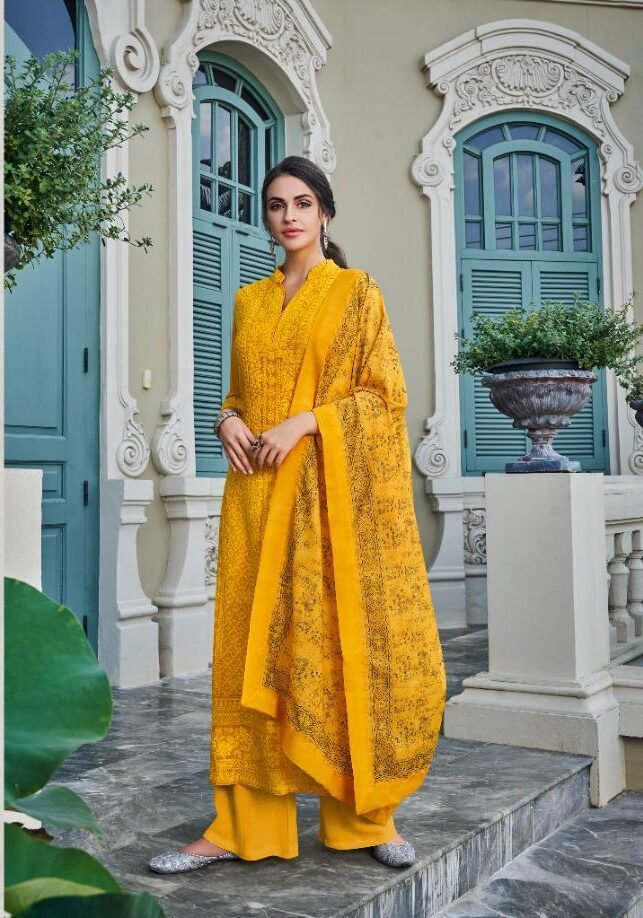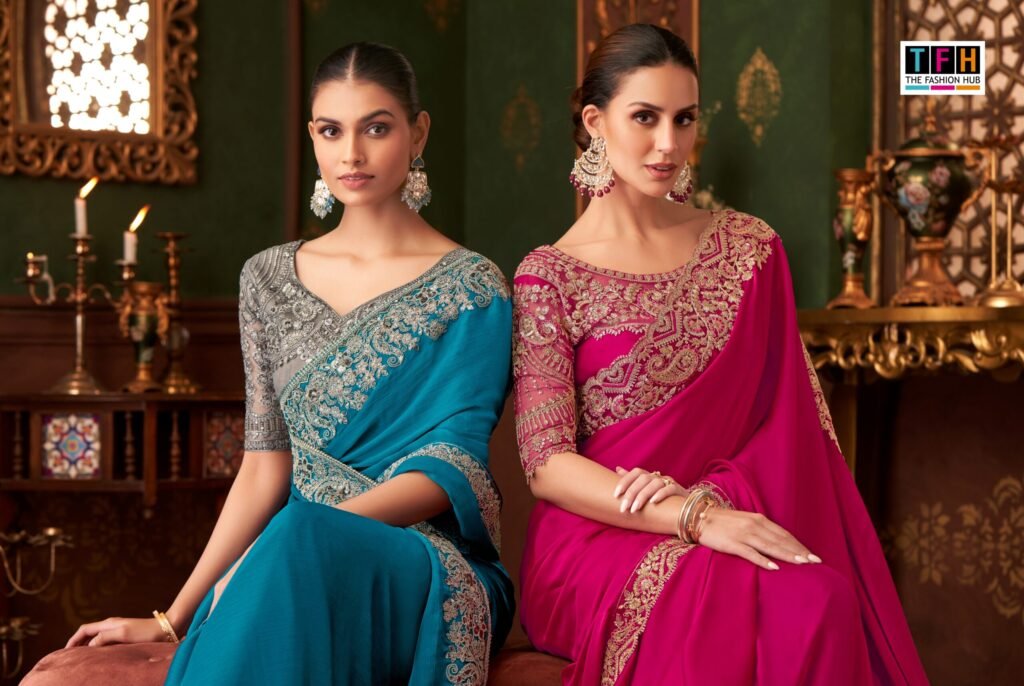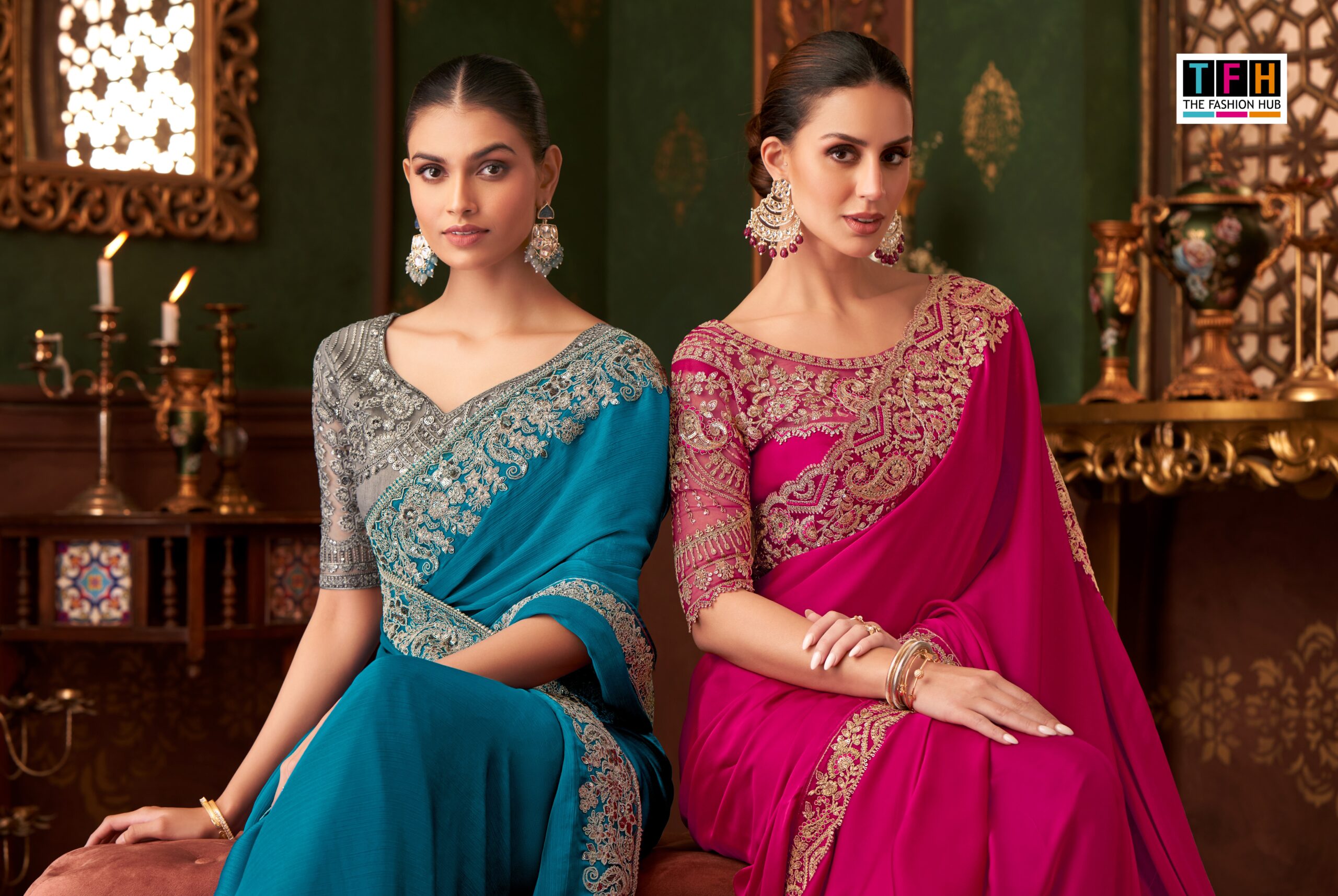Take Tour To Textiles In India And Sarees To India at SHAHiFits
Take Tour To Textiles In India And Sarees To India to know about the textiles and sarees. India is a country of fashion and variety in that sense. Undoubtedly it is remarkable. In fact textiles have bto know een an integral part of the economy of the country. Having several traders and business dealers. Spanning the globe, in Europe, Asia and some parts of Africa are several traces of Indian textiles. In fact India is definitely recognize as one of the textiles hubs in the world. Including several beautifully weaved garments and designs. As a result It is noteworthy that every region has its own peculiar technique for weaving unique fabrics. Here are a few of the common fabrics in the country.

Kalamkari – Andhra Pradesh
Take Tour To Textiles In India And Sarees To India for Kalamkari Saree. The term ‘Kalamkari’ is derives from two Persian words ‘qalam’ which means ‘pen’, and ‘kari’ which means craftsmanship. Definitely it is a type of cotton textile that is hand-paint or block-print. In fact this art was originally uses to tell stories of the great Hindu mythology. So, it symbolizes the presence of Hindu deities. However it is now use on sarees and dupattas. It has two different styles are Mmachilipatnam style and Srikalahasti style. Likewise Machilipatnam style entails block-painting of a fabric. The Srikalahasti style on the other hand it involves hand-painting, using a pen to draft out the pattern and filling in the colors.

Khadi
Take Tour To Textiles In India And Sarees To India for Khadi. Khadi design by hand weaving natural fibre. The fibers are yarns on a charkha (a spinning wheel). As well as resulting fabric is one that goes for every weather, cool in the summer and warm in the winter. It is versatile. It is refers to as khaddar in the British era.

Muga Silk – Assam
Take Tour To Textiles In India And Sarees To India for Muga Silk. Muga is famous for durability and elegance. It produces in Assam. So, this one also refers to as ‘the golden fibre’, that has a yellowish gold tint, and is increasing lustrous. However it earlier reserve for use by royalty. But it now widely used for making the cultural garments of the mekhela chador the Assamese women.

Chikankari
Take Tour To Textiles In India And Sarees To India for Chikankari Saree. As a result of a transformation. While It is a stunning work of art. A transformation of plain cotton into a flowing yard. ‘Chikan’ is deriving from the Persian word ‘Chic’, which refers to ‘Jali’ designs on marble. Chikankari is a flowing garment with six strands of stitches on the right side. over four threads with one picked up. Hence it is a very stylish embroidery.

Kunbi – Goa
Take Tour To Textiles In India And Sarees To India for Kunbi. Kumbi is a cotton fabric, with a saree-like draping just below the knees by the women of Goa. Thus use of this fabric depreciated from the time of the Portugese, and completely stopped in the 20th century. It is a noteworthy fabric, and is one that is still trying to make its way back to the world of contemporary Indian fashion.

Chanderi – Madhya Pradesh
Take Tour To Textiles In India And Sarees To India for Chanderi. These sarees are designing from pure silk, Chaderi cotton, or a smooth blend of silk, cotton and zari. Lternatively Mostly produced from Dobby & Jacquard looms, amongst other traditional looms. According to Hindu mythology. Indeed this traditional saree was first introduced by Shishupal, Lord Krishna’s cousin. Most of the times, it is border round about by rich gold styling. Some have tiny motifs embroideries. Its design features an extraordinarily beautiful yarn of top quality. Fabric is transparent and of sheer texture, So, we call it ‘woven air’

Panja – Panipat, Haryana
Take Tour To Textiles In India And Sarees To India for Panja. Panja fabrics are designed from thick threads; especially it is the weaving technique of the people of Panipat in Haryana. The fabric gets its name from the tools uses in the weaving process – panja. It is usually use for rugs, durries and many other floor coverings, popular throughout the state of Haryana. It features several beautiful and sophisticated patterns.

Pashmina – Kashmir
Take Tour To Textiles In India And Sarees To India for Pashmina. The term ‘Pashmina’ means ‘soft gold’ in Kashmiri. It makes from cream color, intricately embroidered goat wools. It takes a lot of time in production. A week is what it takes to produce a single shawl of the pashmina, and this shawl will be embroidered by hand afterward. The effort put into the production makes it one of the most expensive fabrics.

Kullu Shawls – Himachal Pradesh
Take Tour to Textiles in India and Sarees to India for Kullu shawls. Kullu Shawls is one expensive and hugely demanded fabric. It wove from three types of wool – Local sheep wool, Angora wool and Merino wool. It is unisex fabrics, which wear both men and women. Originally, it designs devoid of any patterns, but now it features several geometric patterns and bright colours. The colours used for the embroidery usually depict nature – green (air), blue (ether), red (fire), yellow (earth), and white (water).

Mysore Silk – Karnataka
Take Tour to Textiles in India and Sarees to India for Mysore Silk Mysore Kingdom is the largest silk producer in India. Its unprecedented growth started during the reign of Tipu Sultan. Mysore silk wove with pure silk, and blend with thin strips of gold zari across the border. Its silk sarees are exquisite and luxurious, of high quality and fine craftsmanship, and have increased fame not only in India, but globally.

Jamdani
Take Tour To Textiles In India And Sarees To India for Jamdani means ‘flowers’. This is the fabric use in weaving terchha sarees. Similarly saree designs with jhalar motifs using in decorating the part of the saree. That goes over the shoulder. And this fabric dates back in history. It is mention in the Kautilya scripts of Arthashashtra. It is also mention in several Arabic, Chinese and Italian scripts.

Paithani – Maharashtra
Take Tour To Textiles In India And Sarees To India for Paithani. It is a handwoven silk saree, of the Paithan town in Maharashtra. This involves a lot of effort in the weaving process, resulting to an extremely elegant fabric, looking exactly the same on either side. It was once considered fabrics of the royals. It is an integral part of the Maharashtrian culture. Yeola is now the centre for Paithani production.

Kasavu – Kerala
Take Tour To Textiles In India And Sarees To India for Kasavu. Kasavu is a cream color saree, with golden zari borders. This is the proud of Kerala. It wove from pure unbleached cotton, and style with gold zari around the borders. It is famous in the region of Malayali, women wear this usually during the occasion of Onam. The saree features kara designs at the bottom of the fabric, a nd usually peacocks and temple patterns on the body.

Naga Shawls – Nagaland
Take Tour to Textiles in India and Sarees to India for Naga shawls. Naga Shawls are making from black and red wools. In fact people making naga shawls in the Nagaland region. Moreover Weaving is the traditional occupation of people from the Nagaland region. Even all the major tribes in the Nagaland region have their own distinctive shawl pattern. Some shawls for warriors made in this region. Shawls feature figures of elephant, tiger, spear, and human head.

Phulkari – Punjab
Take Tour To Textiles In India And Sarees To India for Phulkari. It means ‘flower works’. Besides this fabric is embroidery lavishing motifs of flowers. It is a traditional practice for the women in Punjab. The embroidery makes on the back side of the cloth. So the design takes the right shape in front. It features several bright colors of floral threads on even lighter color fabric.

Kanjeevaram Silk – Tamil Nadu
Take Tour To Textiles In India And Sarees To India for Kanjeevaram Silk Saree. This is the most expensive silk among the textiles in India. The Kanjeevaram silk saree renown for its luster and elegantly detailed zari finishing. It originates from the region of Kanchipuram, in Tamil Nadu. It is one the few sarees in India which still has gold used in the weaving process.

Chikankari – Uttar Pradesh
Take Tour To Textiles In India And Sarees To India for Chikankari. This makes by embroidering chikan stitches around the outline of a block-printed piece of cloth. It is a rather delicate fabric. In fact this fabric introduced by the wife of Jehangir, the Mughal emperor.

Narayan Peth Sari
Take Tour to Textiles in India and Sarees to India for Narayan Peth saree. Saree is the traditional sari of the people in the Maharasthrian region. It makes from silk bordered round. Just like shape about with zari, and designed with rudraksha motifs. It features intricate cultural designs. The weaving process is rather unique, because eight sarees are looms at once.

Manipuri cotton – Manipur
Take Tour To Textiles In India And Sarees To India for Manipuri Cotton. As well as the region of Manipur fame for the production of cotton. In fact commonly referre to as Manipuri cotton. Some of the most famous fabrics in the region include: ‘Phanek’, ‘Lasingphee’ and ‘Moiraingphee’. So, weaving is one of the traditional occupations of people in this region. Hence it is a traditional practice teaches to children. The fabrics are design by nature-inspired motifs.

Kota Sarees
Take Tour To Textiles In India And Sarees To India for Kota sarees. Kota Sarees also known as Kota Doria as they are popular. Sarees are available in pure cotton, silk etc.. In fact it is beautiful blend of both Starch is using to stiffen the yarn in the design of these sarees. Morover Kota Sarees are wove in checks. They are very delicate.

Banarasi Sarees
Take Tour to Textiles in India and Sarees to India for Banarasi sarees. Banarsi Sarees makes from interweaving various hues of silk and gold thread together. So the city of Banaras also produces several other types of Sarees like Georgette and Organza. Therefore the most common designs of these sarees are usually inspired by floral works, village sceneries, nature and temples.

Panchachuli Weave – Uttarakhand
Take Tour To Textiles In India And Sarees To India for Panchachuli Weave. In fact Panchachuli fabrics are very beautiful. Wove from sheep wool and Tibetan cashmere. The women in the Panchachuli region of Himalayas to the north east of Uttarakhand. As a result people of Panchachuli region undertake the production and sale of Panchachuli. As a means of livelihood, along with other high quality products of wools like stoles, wraps and shawls. These woven fabrics have been promoted internationally by the local cooperative of Panchachuli.

Sambalpuri Saree – Odisha
Take Tour To Textiles In India And Sarees To India Sampalpri Saree. Sambalpuri Saree is producted in several districts of Odisha. It is a handwoven ikat saree. Its production involves a tie and dye process. Thus it is wove into an elegant fabric. It has several varieties like Pasapali, Bapta, Barpali and Sonepuri.

Phanek – Manipur
Take Tour to Textiles in India and Sarees to India for Phanek Sarees. Phanek is recognized as the traditional attire of the people of Manipur. That one is a color block striped fabric. In fact makes from interweaving silk and cotton thread together by hand. This is a skirt worn by the women in the region. It features heavy embroideries around the bottom border. For this reason it is wearing with a blouse and upper cloth.

Kuchai Silk – Jharkhand
Take Tour To Textiles In India And Sarees for Kuchai Silk. Kuchai silk is an organic fabric. This fabric makes from the Kharsawan-Kuchai district of Jharkhand. Moreover this fabric has featured increasing demand in recent times.

Bandhani – Gujarat
Take Tour to Textiles in India and Sarees to India for Bandhani sari. Bandhani is derived from the Sanskrit word ‘banda’. Banda word which means ‘to tie’. It is making by the people of the Khatri region in Gujarat. It dates back to the ancient Indus Valley civilization. In fact it produces by tie and dye process. This this textile is found in various colors ranging. Such as black and white, green, yellow, red, blue and orange etc.

Kosa silk – Chhattisgarh
Take Tour to Textiles in India and Sarees to India for Kosa Silk. Kosa in Sanskrit means ‘desi tussar’, made from a worm that is really rare. The entire process of production from extraction to weaving of the kosa silk is a lot of effort taking up to three to six days. So, Kosa silk is very durable. Hence it is very popular in the region of Chhattisgarh, even more than pure silk. Kosa silk produced in Champa, Chhattisgarh is regarded as the finest in the world.

Bhagalpuri Silk – Bihar
Take Tour To Textiles In India And Sarees To India for Bhagalpuri Silk. The city of Bhagalpur is popularly referes to as the ‘Silk City’. The silk weaving industry in the city is over a century old. Bhagalpuri silk is a variant of tussar silk produced in this region. It is woven from dyed threads. So, Bhagalpuri sarees are one of the most favorite sarees of Indian women, due to its variety in color and design.

Apatani – Arunachal Pradesh
Take Tour to Textiles in India and Sarees to India Apatani. Indeed Apatani fabric features several geometric patterns. It has most commonly zigzag and angular designs. Alongwith It originates from the Apatani tribe in Arunachal Pradesh. This tribe has the most advanced weaving technique in the region of Arunachal Pradesh. Apatani fabric is very popular among people in the region. In fact it constitutes part of their daily wardrobe.

Ilkal Saree – Karnataka
Take Tour to Textiles in India and Sarees to India for Ilkal Saree. Ilkal saree is interwoven from cotton for the body, and silk around the border and pallu portion of the saree. In fact it originates from the Ilkal town of Karnataka. The pallu and the body of this saree are joining together by a technique known as the ‘kondi technique’. Even so, it is available in red and white colours. Now days Ilkal Sarees are available around India in many more designs. Even so most of Women like Check Box style Ilkar Sarees.

Bangru print – Rajasthan
Take Tour to Textiles in India and Sarees to India for Bangru Print Saree. Bangru is a traditional printing technique. Saree likes in Rajasthan Region. It uses natural dyes with various colors. In fact most commonly the indigo dye. Thus above all this fabric is considered eco-friendly. Consequently used by monks.

Greatest hub for Take Tour To Textiles In India And Sarees To India
Finally there are various types of sarees that we deliver to whole India. That’s why we have chosen the topic Sarees To India. In addition we also ship Sarees To India from our warehouses from India. In short there are various types of sarees, which Indian woman choose to wear. Overall there are many states in India, Each and every people of every states has different religion and custom. So people choose clothes according to their religion and custom in every state. So, we discussed about Textiles In India And Sarees To India
READ MORE BLOG POSTS:-
Prachi Desai Saree In Red Violet Color
Buy Sarees Online At Shahi Fits
Pure Chiffon Sarees To Make Summer Cool
External Link
Vogue India



































